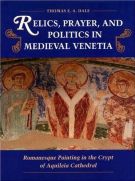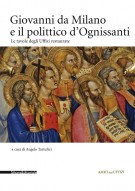Relics, Prayer, and Politics in Medieval Venetia Romanesque Painting in the Crypt of Aquileia Cathedral
| Autore/i | Thomas E. A. Dale | ||
| Editore | Yale University Press | Luogo | London |
| Anno | 1997 | Pagine | 282 |
| Dimensioni | 18x25 (cm) | Illustrazioni | 8 ill. colori, 144 ill b/n, 16 disegni n.t. - colors and b/w ills |
| Legatura | tela ed. sovracc. ill. colori - hardcover with dustjacket | Conservazione | Usato ottime condizioni - used very good |
| Lingua | Inglese - English text | Peso | 1100 (gr) |
| ISBN | 0691011758 | EAN-13 | 9780691011752 |
momentaneamente non disponibile
Against a historical backdrop of relic theft and propaganda campaigns waged by two cities vying for patriarchal authority in medieval Venetia, Thomas Dale shows how Romanesque mural painting shaped sacred space and institutional identity. His focus is on the late twelfth-century murals in the crypt of Aquileia Cathedral. The crypt, which contains the relics of Aquileia's founding bishop, Saint Hermagoras, has a historical significance rooted in a legend identifying the saint as a direct disciple of Saint Mark the Evangelist. On this basis, the Carolingians promoted the city's status as patriarchal see of Venetia--a claim that prompted Venice to steal Mark's relics from Alexandria, Egypt, and appropriate Aquileia's history. This book, the first English-language study of the crypt, explores how the paintings complement the relics of Hermagoras in their distinct devotional and political roles.
Potrebbero interessarti anche...





